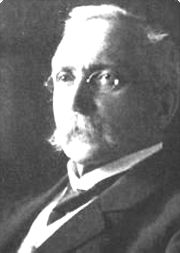- Wilhelm Roux
Infobox Scientist
name = Wilhelm Roux
box_width =
image_width =180px
caption = Wilhelm Roux
birth_date =June 9 ,1850
birth_place =Jena
death_date =September 15 ,1924
death_place =
residence =
citizenship =
nationality = German
ethnicity =
field =Zoology ,anatomy ,developmental biology
work_institutions =
alma_mater = Jena, Strasbourg, Berlin
doctoral_advisor =
doctoral_students =
known_for = Mosaic theory ofontogeny
author_abbrev_bot =
author_abbrev_zoo =
influences =
influenced =
prizes =
religion =
footnotes =
Wilhelm Roux (June 9 ,1850 –September 15 ,1924 ) was a German zoologist and pioneer of experimentalembryology .Roux was born and educated in
Jena ,Germany where he attended university and studied underErnst Haeckel . He also attended university in Berlin and Strasbourg and studied underGustav Schwalbe ,Friedrich Recklinghausen , andRudolf Virchow . Although he was trained as a clinical doctor, he spent his career in experimental biology. His doctoral thesis on the embryological development of blood vessels was a seminal early study in biophysical modelling, a milestone in the study of the cardio-vascular system.For ten years he worked in Breslau (now
Wroclaw ), becoming director of his own Institute of Embryology in 1879. He was professor at Innsbruck, Austria from 1889-95, then accepted a professorial chair at the Anatomical Institute of the University of Halle, a post he retained until 1921.Roux's research was based upon the notion of "
Entwicklungsmechanik " or developmental mechanics: he investigated the mechanisms of functional adaptations of bones, cartilage, and tendons to malformation and disease. His methodology was to interfere with developingembryo s and observe the outcome. Roux's investigations were performed mainly on frogs' eggs to research the earliest structures in amphibian development. His goal was to show Darwinian processes at work on the cellular level.In 1885 Roux removed a portion of the
medulla ry plate of anembryo nicchicken and maintained it in a warmsaline solution for several days, establishing the principle oftissue culture cite web|url=http://caat.jhsph.edu/pubs/animal_alts/appendix_c.htm|title="Animals and alternatives in testing."|accessdate=2006-04-19] which would later be taken up byRoss Granville Harrison andPaul Alfred Weiss .In 1888, Roux published the results of a series of defect experiments in which he took 2 and 4 cell frog embryos and killed half of the cells of each embryo with a hot needle. He reported that they grew into half-embryos and surmised that the separate function of the two cells had already been determined. This led him to propose his "Mosaic" theory of
epigenesis : after a few cell divisions the embryo would be like a mosaic, each cell playing its own unique part in the entire design.After a few years Roux's theory was refuted by the studies of his colleague
Hans Driesch and later, with more precision,Hans Spemann showed that, as a rule, Driesch's conclusions were correct, but that results like Roux's may be obtained after intervention in certain planes. Despite this early lapse into a fallacy ofreductionism , Roux's pioneering mechanical methodology was to prove most fruitful in 20th century biology.Works
* "Der Kampf der Teile im Organismus" (1881)
* "Über die Entwicklungsmechanik der Organismen" (1890)
* "Geschichtliche Abhandlung über Entwicklungsmechanik" (two volumes, 1895)
* "Die Entwicklungsmechanik" (1905)
* "Terminologie der Entwicklungsmechanik" (1912).References
*Citation
id =PMID :9059737
url= http://www.ncbi.nlm.nih.gov/pubmed/9059737
last=Kurz
first=H
last2=Sandau
first2=K
last3=Christ
first3=B
publication-date=1997 Feb
year=1997
title=On the bifurcation of blood vessels--Wilhelm Roux's doctoral thesis (Jena 1878)--a seminal work for biophysical modelling in developmental biology.
volume=179
issue=1
periodical=Ann. Anat.
pages=33-6
*Citation
id =PMID :11619471
url= http://www.ncbi.nlm.nih.gov/pubmed/11619471
last=Hamburger
first=V
publication-date=1997
year=1997
title=Wilhelm Roux: visionary with a blind spot.
volume=30
issue=2
periodical=Journal of the history of biology
pages=229-38
*Citation
id =PMID :12091116
url= http://www.ncbi.nlm.nih.gov/pubmed/12091116
last=Ribatti
first=Domenico
publication-date=2002 Jul
year=2002
title=A milestone in the study of the vascular system: Wilhelm Roux's doctoral thesis on the bifurcation of blood vessels.
volume=87
issue=7
periodical=Haematologica
pages=677-8
*Citation
id =PMID :15637801
url= http://www.ncbi.nlm.nih.gov/pubmed/15637801
last=Kirschner
first=Stefan
publication-date=2003
year=2003
title= [Wilhelm Roux's concept of 'developmental mechanics']
volume=22
issue=
periodical=Würzburger medizinhistorische Mitteilungen / im Auftrage der Würzburger medizinhistorischen Gesellschaft und in Verbindung mit dem Institut für Geschichte der Medizin der Universität Würzburg
pages=67-80See also
*
Cell culture External links
*worldcat|lccn-n87-144436
Wikimedia Foundation. 2010.
